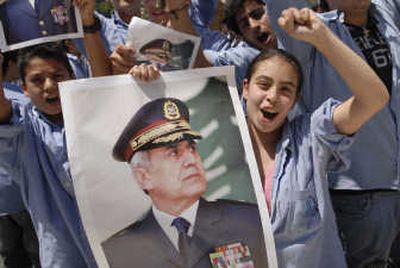Lebanese strike uneasy deal

BEIRUT – The Iranian-backed Hezbollah movement secured all its key demands in a major political deal announced Wednesday by Lebanon’s feuding factions, heralding an end to the long political crisis that had pushed Lebanon dangerously close to civil war.
Lebanese awoke to the startling news that their squabbling leaders had finally agreed on a formula under which a new president would be elected, a new government formed, and the destabilizing 18-month-old occupation of downtown Beirut by Hezbollah protesters would be ended.
The lengthy confrontation more broadly mirrored the struggle for power under way in the Middle East between the United States, which brands Hezbollah a terrorist organization, and Iran, which provides Hezbollah weapons and funding. The outcome reflected Iran’s rising influence in the region since the U.S.-led invasion of Iraq in 2003 brought to power a Shiite government there, extending Iran’s reach into the Arab world.
The deal came only after the Shiite Hezbollah movement had escalated its pressure on the U.S.-backed Lebanese government by staging a military takeover of mostly Sunni West Beirut, defeating pro-government forces in a single night of fierce battles.
By turning its guns on fellow Lebanese, Hezbollah had pushed the issue of its weapons to the fore, and government supporters had been insisting that Hezbollah’s private arsenal be part of any deal.
Instead, Hezbollah won its chief demand, for veto rights in the new government, without having to make any concessions on its weapons, affirming Hezbollah’s stature as “the preponderant military actor and the super political power in Lebanon,” according to political scientist Hilal Khashan of the American University of Beirut.
“It was an excellent deal for the Hezbollah-led opposition and a major defeat for the U.S.-backed government,” he said.
President Bush has repeatedly urged the Lebanese government to stand firm against Hezbollah’s demands, and the deal giving Hezbollah a prominent role in the new government drew a lukewarm reception from Washington. In a statement, Secretary of State Condoleezza Rice called the agreement “a positive step toward resolving the current crisis.”
The accord was brokered by a key U.S. Arab ally, Qatar, which was host to the heads of 17 Lebanese factions at crisis talks in the Qatari capital, Doha. The Arab League, composed mostly of U.S. allies, played a major part in securing the deal, and U.S. foes Syria and Iran both declared their support for it.
Under the new arrangement, parliament will elect as president the current head of the Lebanese Army, Gen. Michel Suleiman, probably Sunday, ending a six-month vacancy in the presidency. Then, a new government will be appointed in which Hezbollah has enough seats to veto key decisions.
The veto rights ensure that the new government won’t be able to challenge Hezbollah’s mushrooming arsenal of weapons, a key reason that Hezbollah was demanding the extra seats in the Cabinet. It was a government decision to investigate Hezbollah’s private telecommunications network that had triggered Hezbollah’s military offensive. Hezbollah is allowed to maintain an arsenal to defend the country against Israel.